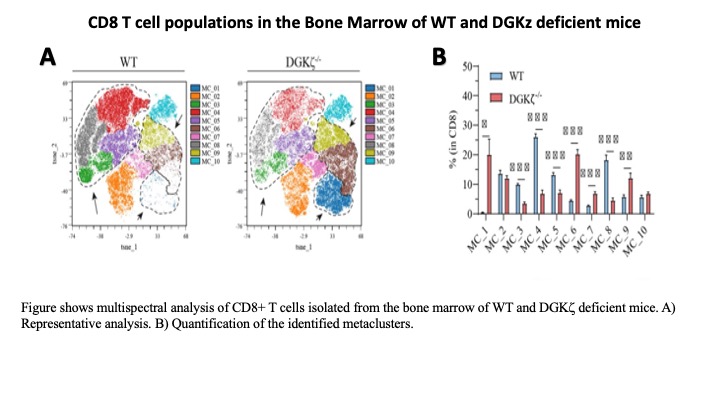
- Tipo de expresión:
- Doctorado: Propuesta de dirección de tesis doctoral/temática para solicitar ayuda predoctoral ("Hosting Offer o EoI")
- Ámbito:
- T lymphocyte Biology
- Área:
- Vida
- Modalidad:
- Ayudas para contratos predoctorales para la formación de doctores (antiguas FPI)
- Referencia:
- 2023
- Centro o Instituto:
- CENTRO NACIONAL DE BIOTECNOLOGIA
- Investigador:
- M.ISABEL MERIDA DE SAN ROMAN
- Palabras clave:
-
- T lymphocytes, cáncer, Immunotherapy, Diacylglycerol Kinases, Exhaustion, Immune checkpoint
- Documentos anexos:
- 606256.pdf
PRE2023- DGKtargeting as an strategy to promote antitumor T cell functions. (PID2022-136871OB-I00)
In our laboratory we work to demonstrate that fine-tuning of DAG-based signals by Diacylglycerol Kinases (DGK) A and Z represents a critical strategy to ensure adequate antitumor T cell functions. Solid tumors escape from T cell destruction through several mechanisms that include recruitment of suppressive immune cells and the activation of negative regulators of cytotoxic T cell functions. Tumor infiltrating T cells express receptors with negative functions, the so-called immune checkpoints like PD-1. Targeting IC has shown excellent results but unfortunately acquired or innate resistance limit the success of these therapies. The abnormal expression of negative regulators like DGKs contribute to the acquisition. of hypofunctional/exhausted profiles. The proposed project is part of an ample study aimed to investigate the potential of DGK targeting as a novel approach to revitalize antitumor immune responses against advanced solid tumors. In particular, this project will the use of a combination of cell-based assays and mouse preclinical models to dissect the consequences of DGK targeting to limit the growth and dissemination of metastatic tumors. Based on the use of multispectral flow cytometry and imaging approaches as well as genetically modified mice and pharmacological inhibitors, the results from this project will help to provide a broad picture of DGKZ -dependent control of niche-specific tumor growth and metastasis.
Additional information
Contact with this unit